- Home
- Vicki Delany
Body on Baker Street
Body on Baker Street Read online
Sherlock Holmes Bookshop Mystery
Elementary, She Read
Year Round Christmas Mysteries
We Wish You a Murderous Christmas
Rest Ye Murdered Gentlemen
Lighthouse Library Mysteries (writing as Eva Gates)
Reading Up a Storm
Booked for Trouble
By Book or By Crook
Constable Molly Smith Mysteries
Unreasonable Doubt
Under Cold Stone
A Cold White Sun
Among the Departed
Negative Image
Winter of Secrets
Valley of the Lost
In the Shadow of the Glacier
Klondike Gold Rush Mysteries
Gold Web
Gold Mountain
Gold Fever
Gold Digger
Also Available by Vicki Delany
More Than Sorrow
Burden of Memory
Scare the Light Away
Body on Baker Street
A SHERLOCK HOLMES BOOKSHOP MYSTERY
Vicki Delany
NEW YORK
This is a work of fiction. All of the names, characters, organizations, places, and events portrayed in this novel are either products of the author’s imagination or used fictitiously. Any resemblance to real or actual events, locales, or persons, living or dead, is entirely coincidental.
Copyright © 2017 by Vicki Delany
All rights reserved.
Published in the United States by Crooked Lane Books, an imprint of The Quick Brown Fox & Company LLC.
Crooked Lane Books and its logo are trademarks of The Quick Brown Fox & Company LLC.
Library of Congress Catalog-in-Publication data available upon request.
ISBN (hardcover): 978-1-68331-299-4
ISBN (ePub): 978-1-68331-300-7
ISBN (ePDF): 978-1-68331-302-1
Cover illustration by Joe Burleson
www.crookedlanebooks.com
Crooked Lane Books
34 West 27th St., 10th Floor
New York, NY 10001
First Edition: September 2017
For the happy couple: Julia and Coleman, September 2, 2017
Contents
Chapter 1
Chapter 2
Chapter 3
Chapter 4
Chapter 5
Chapter 6
Chapter 7
Chapter 8
Chapter 9
Chapter 10
Chapter 11
Chapter 12
Chapter 13
Chapter 14
Chapter 15
Chapter 16
Chapter 17
Acknowledgments
Chapter 1
“Sherlock Holmes Bookshop and Emporium, Gemma speaking.”
“Hi. I . . . I . . . uh . . . May I speak to the person in charge of author events? Please?”
“I’d be happy to help you.” I put down my pen and opened the store calendar on the computer. Most of the best dates over the summer and into the fall were already booked. “Can you tell me something about yourself and your book?” As the name of my shop suggests, we focus on Sherlock Holmes and Sir Arthur Conan Doyle, but I try to support local writers whenever I can, regardless of what they’ve written.
“Oh, sorry,” she replied. “Didn’t I say?”
“No, you didn’t.”
“It’s not me. I mean, I’m not going to be speaking or signing. I’m calling for my boss.”
“Let’s start with the title of your boss’s book, shall we?” While my attention was distracted, Moriarty the shop cat settled himself in the center of the publisher’s catalog I’d been browsing. I wiggled the edges of the paper. He hissed at me. I poked his side with a pencil. He hissed louder.
Desperate measures were called for. I feigned as if turning back to the computer and then swept in, picked him up, and put him on the floor. He managed to give my arm a light scratch.
Moriarty lived on the premises. Small and thin and pure black, he was a great shop cat. Everyone loved him. He could be counted on to be charming and friendly to shoppers and to treat their children according to their age. He seemed to be able to tell which people didn’t care for cats, and in those cases, he respectfully kept his distance.
Everyone loves Moriarty. Except me.
That is because Moriarty loves everyone. Except me.
This time he hadn’t drawn blood. I consider that a victory. He held his tail high and stalked across the room and out the door without as much as a backward glance of apology.
I returned my attention to my caller. “I’m sure we can arrange something. How about mid- to late August or early September? The Labor Day weekend is booked, I’m afraid, but . . .”
She cleared her throat. “I know it’s short notice, but she’s changed her mind, and, well . . . I was hoping”—she had a high-pitched voice and spoke as though she were not quite sure she was allowed to—“for Saturday.”
“Saturday? You mean the day after tomorrow? That won’t be possible.”
“I checked your events listing before calling, and I don’t see anything advertised.”
“We don’t have anything planned for that day, that’s true, but I have to order the books, advertise the event. You do want me to advertise it, don’t you? People need advance notice to put it on their calendars.”
“She only decided to go to Cape Cod last night and reluctantly agreed to do one signing this weekend. She won’t be pleased.”
“Sorry,” I said. I’ve found most writers to be extremely pleasant, lovely people, more than happy to do whatever they can to accommodate my bookshop and schedule. The odd one, however, seemed to think he or she was doing me an enormous favor by bothering to stop in and grace us with their presence.
“I understand. I do. This must be highly inconvenient for you. It’s possible you have some books in stock already. It’s called Hudson House.”
“Hudson House?” I stared, first at the phone in my hand, and then at the boxes of books piled on the floor of my office. I have a storage room, but overflow tends to find its way in here. “You don’t mean . . .”
“The author’s name is Renalta Van Markoff. That’s R-E-N—”
“I know. Thanks. What’s your name?”
“Oh, didn’t I say?”
“No, you didn’t. I’m Gemma Doyle. I’m the owner and manager of the store.” I am also the chief duster, the head bookkeeper, the buyer, the returner of unsold stock, the human resource manager (of the single employee), the cat feeder and litter box cleaner, and the head sales clerk. I didn’t bother to tell my caller all of that. The poor woman sounded like a bundle of nerves. I wondered if she was always so nervous or if her boss was standing over her, impatiently tapping a ruler into the palm of her hand.
“Linda Marke. Miss Van Markoff’s personal assistant.”
The boxes surrounding me were full of copies of Hudson House, the latest in the pastiche series by Renalta Van Markoff. The book had been released only two days ago and was already on its way to hitting number one on the New York Times bestseller list. It was also currently the bestseller in my shop. “Are you saying that Renalta Van Markoff wants to do a signing here, in West London?”
“Yes.”
“The day after tomorrow?”
“Yes.”
I took a deep breath. Wow. Two years ago, when the first book in the Hudson and Holmes series, An Elementary Affair, began to generate notice (and huge sales), I tried to invite Renalta Van Markoff to the bookshop. I never managed to get past personal assistants, publicists, and other interfering busybodies. I’d been led to believe that my tiny shop wasn’t big enough, important enough, to host Miss Van M
arkoff.
Maybe none of her staff had bothered to ask the author what she thought of that.
I would do whatever I had to do to get her here on Saturday. “I have plenty of books in stock, and I should be able to get more in time. How about half one?”
“Half of what?”
“Sorry. I mean one thirty. Readers can have lunch, maybe enjoy some time at the beach, and then come to the store.”
“Thank you,” Linda said. The relief in her voice was obvious. “That would be wonderful.”
“Great. I’ll see you then. Do you have any special requirements? I’ll provide water for Ms. Van Markoff. Tea or coffee if she’d prefer. A signing table, pens. Anything else?”
“I’ll be there this afternoon. We can talk then.”
“You’re coming here? Today?”
“I need to see the layout of the store. Decide where Miss Van Markoff will stand to speak and where she will sit to sign. She’s very . . . particular. You do have a podium, of course.”
“Of course,” I said. Meaning no, but I could try to find one.
“How does one o’clock sound?”
“I’ll be here.”
“Thank you very much. This means a lot to me . . . I mean to Miss Van Markoff.”
She hung up.
I stared at the phone for about two seconds. Then I leapt to my feet. I bolted out of the office and dashed down the stairs. I made it about halfway before turning around and running back up to open one of the boxes and grab a handful of books. They were weighty tomes. I hadn’t even glanced inside one yet, but I estimated it to have 736 pages.
Back downstairs with my arms loaded with books. Moriarty tried to trip me on the bottom step, but I was ready for him, and I deftly dodged his outstretched paw.
“What’s got you in such a tizz?” Ashleigh, my new assistant clerk, asked.
I dropped the books on the counter. “I want a big display of these. Along with the earlier ones in the series.” Like most mystery novels, when a new book was released, the sales of the earlier in the series went up substantially.
“We already have a big display of those.” Ashleigh gestured to the center table, piled high with hardcover copies of Hudson House. The cover showed a street of three-story white row houses with black doors, pillared entranceways, and second-floor balconies with black iron railings. A woman, dressed in a brown-and-gold silk gown with a spray of feathers in her dark hair, was coming out of a house with “221” prominently displayed on one of the pillars. The street might have been one that I’d lived on in London, but if so, it was of another time. A hansom cab could be seen disappearing into the mist. It was night, and thick fog swirled around gas lamps.
“We need more,” I said.
“Why?” Ashleigh asked. She’d only been working here for a short time, and she was proving to be hardworking and reliable. She had a tendency to question everything I did. This can be good in an employee—keeps me on my toes. It can also be bad—I am the boss, after all.
“Someone from the publisher is dropping by this afternoon. I want it to look like we’re promoting this book hard.”
“Which we are,” Ashleigh said.
“Even harder, then,” I said.
At that moment, Ellen, one of my regular customers, dropped a copy of Hudson House on the counter. “I’ve been so looking forward to this one. I wish Renalta Van Markoff would write faster.”
“You’ll have plenty of time to get into it,” I said. “Now that your husband’s moved out of the house.”
She stared at me. “How do you know that?”
“Didn’t you mention it, Ellen?”
“I most certainly did not. Not to you or to anyone.”
“Just a guess.” I busied myself arranging the volumes. The covers of Renalta’s three books all showed the same street. A woman coming out of (or going into) number 221. Only the time of day, the weather, and the woman’s attire differed.
“That was quite the guess,” Ashleigh asked once Ellen, giving me more suspicious glances, had left.
“I never guess. Ellen comes in here once a month or so. She’s very fond of gaslight mysteries and buys her favorites in hardcover as soon as they come out. An excellent customer. She’s always dressed well and groomed to the nines. I once overheard her complaining to a friend that her husband was drinking more than she liked. Today, I noticed that her engagement ring is dirty, meaning she’s been fingering it a great deal lately and not taking the time to clean it. She’s wearing sandals, but the paint on her toenails is chipped, indicating a lack of interest in her appearance. As does the unraveling hem in her blouse and the stain on the front.”
“Maybe she got the stain at breakfast and hasn’t been home to change.”
“It was at least two days old.”
“I hope you’re not able to tell my innermost secrets by the way I dress or if I washed my shirt since last time I wore it.”
“You,” I said, “are an enigma.”
“And proud of it,” she replied.
I’d not yet seen Ashleigh in the same outfit twice. Not just outfit but style. She came to the interview in proper business attire—hair scraped back in a stiff bun, gray skirt to the knees, neat gray jacket, ironed white shirt buttoned to the top, flat pumps. The first day of work she resembled a California girl heading for the beach with a surfboard on top of her Volkswagen Beetle, in a swinging ponytail, short red-and-white skirt, pink T-shirt, and flip-flops. I didn’t mind, as long as the skirt wasn’t too short or the shirt too tight. We were a summer vacation town, after all. The following day, she appeared in a safari jacket, multipocketed khaki pants, hiking boots, and even a pith helmet. Today’s outfit was “ladies who lunch at the yacht club.”
The bells over the door tinkled, and Ashleigh called out, “Welcome! Let me know if you need anything.”
“Ooh, you have it,” the new arrivals squealed. They both scooped up copies of Hudson House. “I knew you would.”
“If you like that series, you might also like . . .” Ashleigh discreetly led the women to the gaslight fiction shelf.
I picked up a copy of the book and checked the last page. 720. Rats, I’d been off by sixteen pages.
Along with my great uncle Arthur, I own the Sherlock Holmes Bookshop and Emporium, located at 222 Baker Street, West London, Massachusetts. As can be assumed by the name, we stock Sherlock Holmes–related books and merchandise. Not only second and later editions (and the occasional first) of the original Sir Arthur Conan Doyle books or the magazines in which the stories appeared, but modern pastiche novels, short story collections, and anthologies. As many of those as there are (and more every day), it’s not enough to keep a bookshop fully stocked, so we also sell nonfiction relating to the life and times of Doyle and his contemporaries and historical fiction we call gaslight—books set in the mid- to late Victorian or Edwardian periods. The “Emporium” part of the shop’s name refers to all the coloring books, games, puzzles, mugs, teacups, posters, DVDs, making-of books, and so on related to Holmes and Watson. I never fail to be astonished at what some fans will consider to be treasures.
I glanced around the shop. Ashleigh was busy with the two women, their arms now laden with books. “Personally,” she said, “I far prefer Laurie R. King’s Mary Russell to the Van Markoff books. But it’s a matter of individual taste.”
“I’ll give one of those a try then,” the shopper said, and The Beekeeper’s Apprentice was added to the pile.
A family browsed the children’s section, and a group of vacationing hipsters was studying the Sherlock paraphernalia, exclaiming everything to be “cool” and “ironic.” I feared that we’d soon be due for a fresh interpretation of the Great Detective with unkempt beard and man-bun.
“I’m popping into the tea room,” I called to Ashleigh.
She lifted one hand in reply.
My shop is attached to the building next door, number 220. A year ago, we’d knocked down part of the wall, put in a sliding glass door,
and opened Mrs. Hudson’s Tea Room. Uncle Arthur and I own half of that business. Jayne Wilson owns the other half and manages the tea room and serves as the head cook and baker. As well as my business partner, she’s also my best friend.
“Jayne in the back?” I called to Fiona, who was ringing up a takeout coffee and bran muffin.
“Where else would she be?” Fiona asked.
“Good point.” I went into the kitchen. It was eleven thirty and the kitchen was a flurry of activity as Jayne and her helper, Jocelyn, did lunch and tea prep. Mrs. Hudson’s wasn’t only a tea room; Jayne serves takeout coffee and baked goods all day, lunch from eleven until two, and afternoon tea from one until closing at four.
When we first began planning the tea room, I told her that one o’clock was ridiculously early for afternoon tea. She’d replied that the Orangery at Kensington Palace starts serving afternoon tea at noon. So there. I gave in, realizing that in the face of the modern tourist industry, some standards have to give.
“Busy?” I asked. The question was redundant, seeing as giant pots of soup simmered on the stove; Jocelyn was up to her elbows in sliced tomatoes, onions, and peppers for lunch sandwiches; a tray of raspberry muffins waited to be taken out front; Jayne’s face was dotted with flour, her white apron had streaks of chocolate, and she was rolling out massive sheets of dough. But after my faux pas earlier regarding the state of Ellen’s marriage, I was attempting to act more “normal” when engaging in social discourse. Whatever that means.
“What do you want, Gemma?” Jayne asked.
Definitely busy. She didn’t usually snap at me. I try hard to stay out of her realm, which isn’t difficult. A kitchen, of any sort, is not my natural environment.
“Something came up that I thought you might be interested in. How’s the book going? Hudson House. Have you had time to read it?”
“Gosh, Gemma. It’s so good, I’ve scarcely gotten any sleep for days.” The store had received an advance review copy some months ago from the publisher. I’d begun the first in the series but had never finished it. Too overwrought and overwritten for my taste. I thought it read more like a historical romance than a Holmes pastiche. To my surprise, the moment Jayne spotted the copy of Hudson House on my desk, she pounced. She declared herself to be a huge fan of the series.

 Silent Night, Deadly Night
Silent Night, Deadly Night Coral Reef Views
Coral Reef Views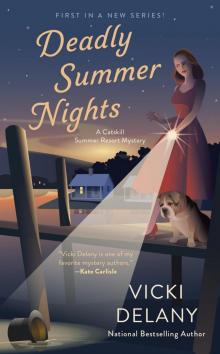 Deadly Summer Nights
Deadly Summer Nights Murder in a Teacup
Murder in a Teacup Whiteout
Whiteout Dying in a Winter Wonderland
Dying in a Winter Wonderland Tea & Treachery
Tea & Treachery Rest Ye Murdered Gentlemen
Rest Ye Murdered Gentlemen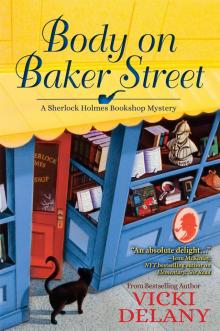 Body on Baker Street: A Sherlock Holmes Bookshop Mystery
Body on Baker Street: A Sherlock Holmes Bookshop Mystery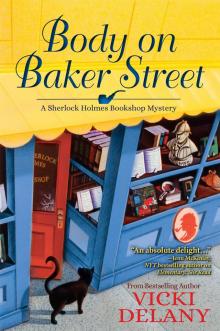 Body on Baker Street
Body on Baker Street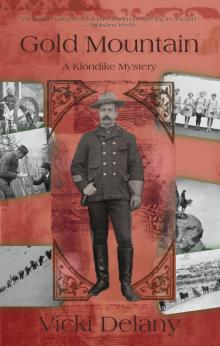 Gold Mountain
Gold Mountain Blue Water Hues
Blue Water Hues Hark the Herald Angels Slay
Hark the Herald Angels Slay Murder at Lost Dog Lake
Murder at Lost Dog Lake Blood and Belonging
Blood and Belonging A Winter Kill
A Winter Kill White Sand Blues
White Sand Blues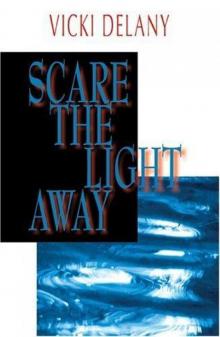 Scare the Light Away
Scare the Light Away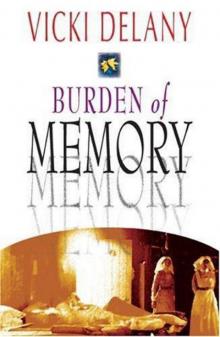 Burden of Memory
Burden of Memory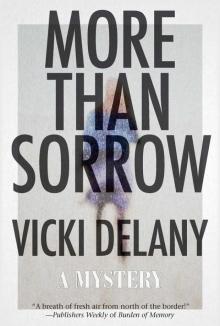 More Than Sorrow
More Than Sorrow In the Shadow of the Glacier
In the Shadow of the Glacier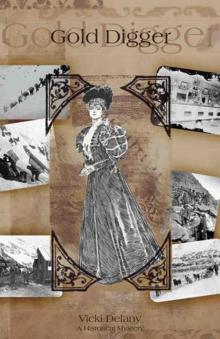 Gold Digger: A Klondike Mystery
Gold Digger: A Klondike Mystery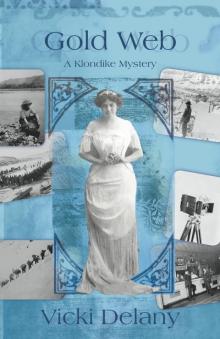 Gold Web
Gold Web Haitian Graves
Haitian Graves Valley of the Lost
Valley of the Lost We Wish You a Murderous Christmas
We Wish You a Murderous Christmas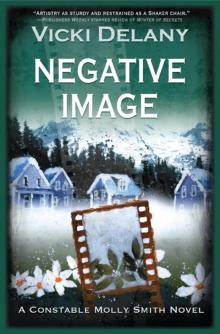 Negative Image
Negative Image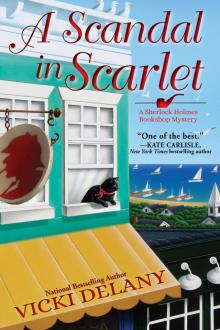 A Scandal in Scarlet
A Scandal in Scarlet Juba Good
Juba Good Winter of Secrets
Winter of Secrets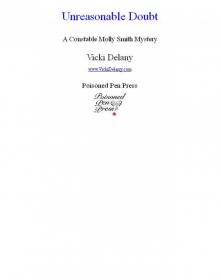 Unreasonable Doubt
Unreasonable Doubt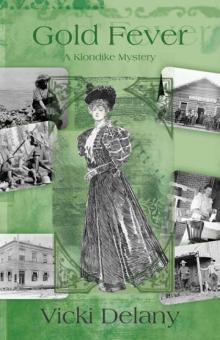 Gold Fever
Gold Fever Among the Departed
Among the Departed Elementary, She Read: A Sherlock Holmes Bookshop Mystery
Elementary, She Read: A Sherlock Holmes Bookshop Mystery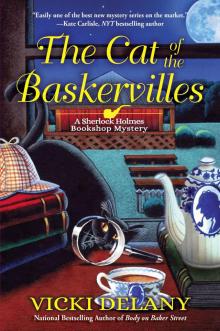 The Cat of the Baskervilles
The Cat of the Baskervilles